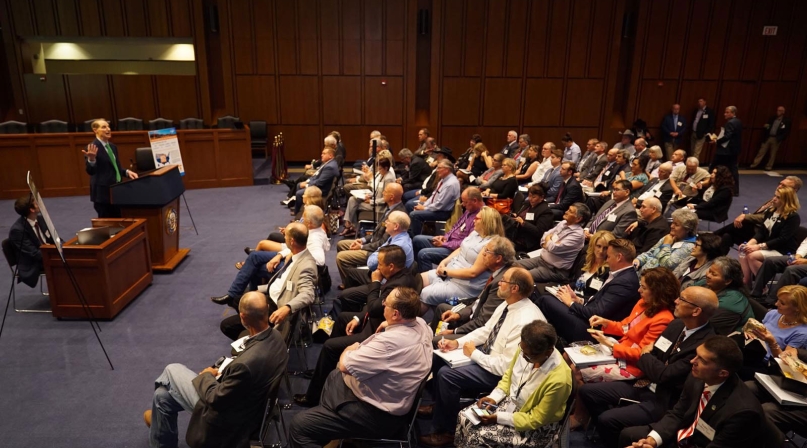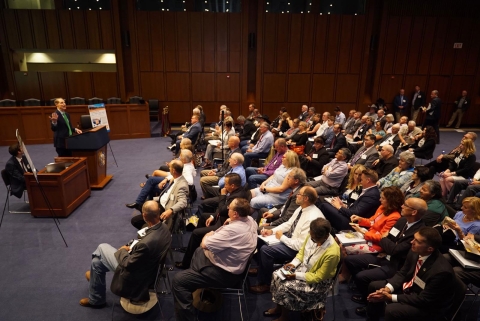Robust crowd turns out to advocate for PILT, SRS

Key Takeaways
One of the largest PILT fly-ins in years brought roughly 100 county officials to Capitol Hill Sept. 11 to advocate on behalf of permanent mandatory funding for the Payment in Lieu of Taxes (PILT) program and permanent funding for the Secure Rural Schools (SRS) program.
Both programs compensate counties that contain federally managed land, which cannot yield property tax revenue and counties that have seen a decline in timber harvests from federally managed forest land. PILT paid out $514 million in fiscal year 2019.
County officials met with members of Congress and their staffs, primarily from their home states and members that serve on appropriations committees and authorizing committees that could help advance legislation.
During a Capitol Hill briefing, Sen. Ron Wyden (D-Ore.) discussed his proposal to reauthoritze PILT for 10 years.
Sen. Steve Daines (R-Mont.) talked up his bill that would expand PILT funding for counties with fewer than 5,000 residents. It would not reduce the PILT amounts paid to larger counties.
One of the most effective points a county official can make is showing how federal policy affects local management and services. For Chaves County, N.M. Commissioner Robert Corn, volatility is a huge problem.
“We don’t know if it (PILT funding) is coming, when it’s coming, how much is coming,” he said. “We fund vehicles for the roads department and sheriff’s office with PILT money, so if it’s not looking good, it’s a matter of trying to get a few more thousand miles out of a vehicle and hoping it holds, rather than replacing it.”
Supervisor Richard Lunt demonstrated to his congressional delegation how budgeting in Greenlee County, Ariz. was complicated by irregular PILT funding.
“We can’t get the biggest bang for our buck, being able to do purchasing that is efficient, buying in bulk, if we don’t have the money,” he said. “The government knows it’s getting a bargain for the services we provide around federal lands. Every year hunters get lost, and every year, we’re sending out law enforcement to find them. It’s something we’re glad to do but there’s no question it’s a bargain for what the federal government gets.”
The large fly-in contingent coincided with an influx of freshman members of Congress. Cascade County, Mont. Commissioner Joe Briggs, who serves as NACo’s West Region representative, offered some advice to newcomers to Capitol Hill.
“There can be an assumption that all the congressional staff members know what the other staffs are doing, and that’s not the case,” he said. “Sometimes we are a bridge, telling them what else we have heard on the Hill because they can get siloed in their offices.”

Attachments
Related News
Next step on PILT requires more outreach
Facing headwinds on making PILT funding permanent, county veteran Rep. Celeste Maloy (R-Utah) told county officials to reach out to any member of Congress who will listen.

Counties receive first Secure Rural Schools payments after program is reauthorized
On February 20, the U.S. Forest Service (USFS) announced that counties across the country will receive payments through the Secure Rural Schools (SRS) program for the first time in nearly two years. The release of payments will deliver critical relief to timber-dependent counties that rely on these funds to maintain essential services as they transition toward long-term fiscal stability.

House Agriculture Committee introduces 2026 Farm Bill
On February 13, House Agriculture Committee Chairman G.T. Thompson (R-Pa.-15) introduced the House version of the 2026 Farm Bill, the Farm, Food, and National Security Act of 2026.
